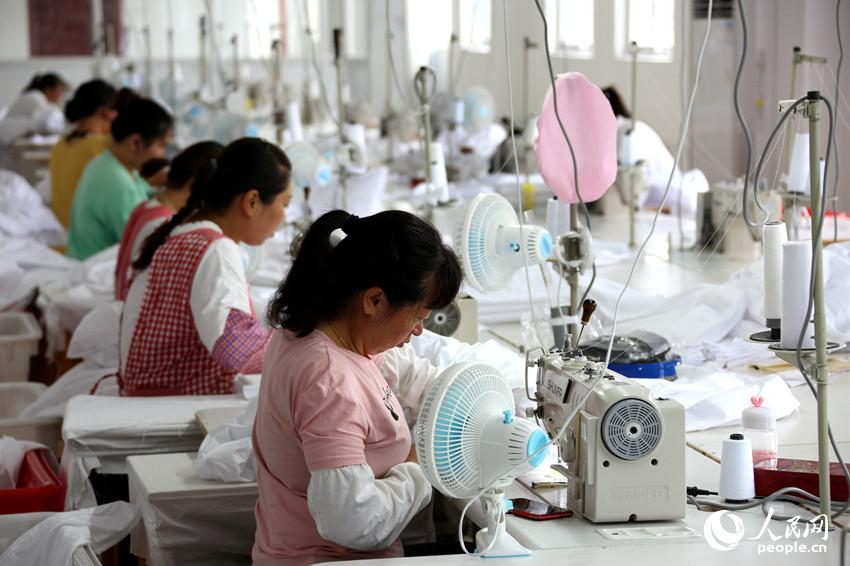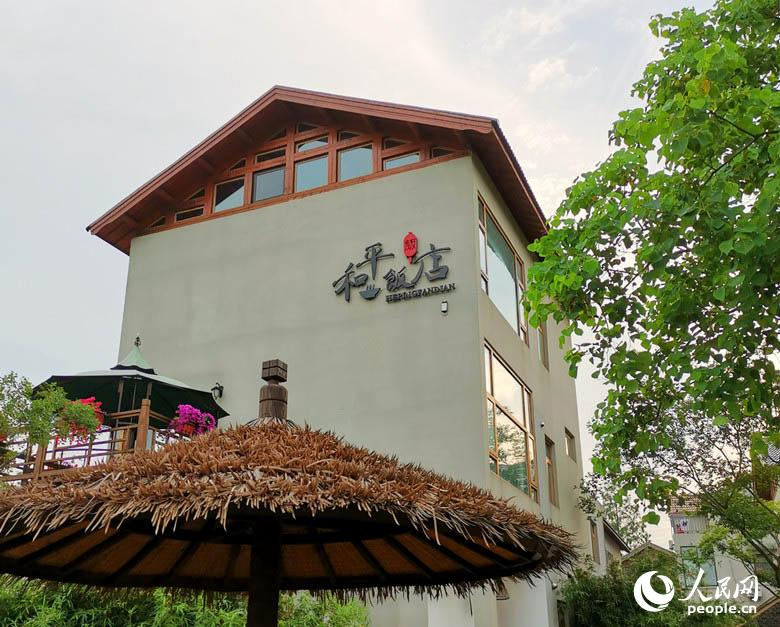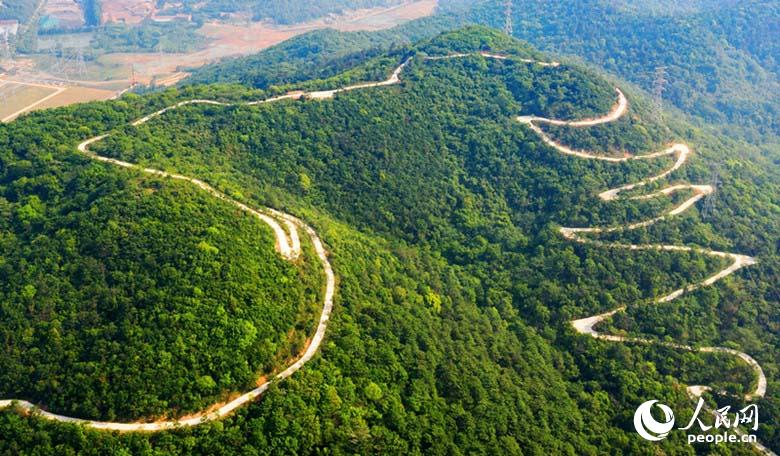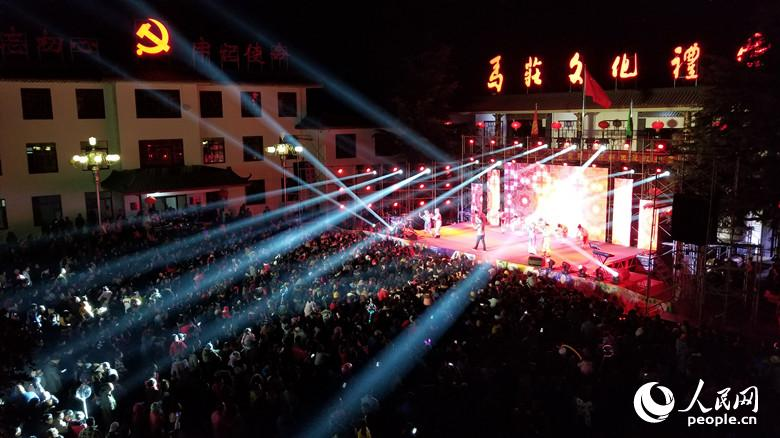

East China’s Jiangsu is taking the leading in building a moderately prosperous society in all respects at a level that embodies prosperity, sustainability and civility, serving as a successful example in this regard.
Rows of villas line a river running through Kaixiangong Village in the southern part of the province. The village has achieved steady development, with a collective income of 3.18 million yuan (almost 450,000 USD) and 1.2 private cars per household. There are many similar villages like Kaixiangong in southern Jiangsu.
The 18th National Congress of the Communist Party of China (CPC) set a goal to double the 2010 GDP and per capita personal income by 2020, an important indicator for finishing the building of a moderately prosperous society in all respects.
Achieving the goal ahead of schedule, in 2019 Jiangsu province’s GDP exceeded 9,963.1 billion yuan, ranking second nationwide, and its per capita disposable personal income hit 41,400 yuan, both of which doubled the figures from 2010.

Photo shows Kaixiangong village in Suzhou, east China’s Jiangsu province. (Photo/Leng Jinming)
The unbalanced development between the southern and northern parts of the province has been a tough issue to tackle. “Northern Jiangsu is the measure of success in building a moderately prosperous society in all respects and at a high level,” said Secretary of the CPC Jiangsu Provincial Committee Lou Qinjian, adding that after years of efforts, now people in the region are embracing a well-off life.

People in Shihe township, east China’s Jiangsu province, find jobs near home through a poverty relief plant. (Photo/Wang Xinnian)
To win the battle against poverty in Huai’an in northern Jiangsu, the province started with the income increase of poor villages and low-income farmers. According to the province’s plan, the operating income of each poor village should exceed 180,000 yuan, and the poverty line for low-income people should be an annual per capita net income of 6,000 yuan during the 13th Five-Year Plan.
Gu Zhou, Party head of Songji village, Qingong township of the city’s Huai’an district, feels confident about the two indicators.

A water bird in the Daxigang Wetland Park, Xin’an neighborhood, Xinwu district, Wuxi, east China’s Jiangsu province perches on a fence above the water. (Photo courtesy of Xin’an neighborhood of Xinwu district)
“We’ll reap a bumper harvest of fruits this autumn,” said Gu, explaining that the village set up a cooperative in 2018, planting over 20 hectares of pecans, 6.6 hectares of apples and 6.6 hectares of peaches. The provincial poor village’s development of the fruit industry is inseparable from the pairing assistance by the province’s forestry bureau.
According to the official, there were 511 registered low-income farmers from 166 households in the village with a population of more than 3,200. With an underdeveloped collective economy, the village also faced serious problems of left-behind children, women and seniors. Gu didn’t expect that the village would shake off poverty so quickly.

Photo shows a restaurant in Qianjiadu village, Jiangning district, Nanjing, east China’s Jiangsu province. (Photo/Leng Jinming)
Songji has also developed the under-forest industry. Last spring, the village planted 20 hectares of cabbages under the fruits, adding over 60,000 yuan for the collective. In the second half of 2019, the planting of rutabaga and radish increased the collective income by 150,000 yuan. Chickens, ducks and geese are also raised under the forest, and more than 20,000 poultry have been slaughtered this year.

Aerial photo shows a zigzagging road that has been nicknamed the “mini Sichuan-Tibet Highway” due to its beauty in Jiangning district, Nanjing, east China’s Jiangsu province. (Photo/Li Wei)
Over the past two years, 245 households, including 102 registered low-income families, contributed more than 106.6 hectares of land to the cooperative. They can get a guaranteed return of 900 yuan per 0.06 hectares of land, dividends from the cooperative’s total revenue at the end of each year, and an average daily salary of 80 yuan.
As a result, the village’s collective income has soared to 400,000 yuan from 220,000 yuan in 2018. The figure is expected to exceed 600,000 yuan this year. Meanwhile, the per capita net income of villagers increased from 15,000 yuan in 2018 to last year’s 18,000 yuan, which is expected to surpass 20,000 yuan this year. All registered low-income villagers shook off poverty last year.
Shihe township, 50 km south of Songji, is lifting people out of poverty through poverty relief industrial projects. Three years ago, the township established a 2,041.7-square-meter standard plant with a 2 million yuan provincial fund for targeted poverty alleviation and rent it to a leading local company. Thanks to the project, over 60 villagers found jobs near home, and the annual rent of 160,000 yuan has been used to help 270 registered poor households get rid of poverty.
According to the Jiangsu Provincial Office of Poverty Alleviation, by the end of 2019 the annual per capita income of 2,540,000 registered poor rural people in the province, or 99.9 percent of the total, had reached 6,000 yuan, and all 12 provincial poor counties and districts had shaken off poverty.
Jiangsu has made remarkable progress in environmental protection. In 2007, cities around the Taihu Lake, including Suzhou, Wuxi and Changzhou, made huge investments in ecological restoration of the lake, leading to gradually improved water quality. In early 2013, the three cities were awarded the titles of national ecosystem-friendly cities for their progress.

Photo shows a scene of the art performance by the farmers’ brass band at the auditorium in Mazhuang village, Xuzhou, east China’s Jiangsu province. (Photo courtesty of the publicity department of Jiawang district)
In 2016, the Daxigang Wetland Park in the Xin’an neighborhood of Wuxi’s Xinwu district was upgraded to a provincial one. One year later, the neighborhood grew flowers on contiguous uncultivated land, making it a popular tourist destination. In 2019, the Huihaiwan Ecological Park covering 340,000 square meters began to receive visitors.
Ecological progress also brings benefits to the waterside Qianjiadu Village in Nanjing’s Jiangning district. Since 2009, the district began to build beautiful pilot villages. Located in the junction of the Qinhuai, Lishui and Jurong rivers, the village has maintained a balance between economic development and ecological protection.
In 2017, Qianjiadu was listed as one of the province’s first batch of distinctive villages. According to Li Hai, deputy head of Jiangning’s bureau of agriculture and rural areas, the district has over 1,000 pilot villages like Qianjiadu.

Photo shows Enlai community, a model one in Huai’an, east China’s Jiangsu province. (Photo/He Zhuoyan)
There is a zigzagging road that has been nicknamed the “mini Sichuan-Tibet Highway” due to its amazing natural scenery in the district, attracting more and more tourists here. The 8.5km-long road with 38 curves has brought prosperity to the local people.
Jiangsu has also been vigorously promoting social civility and witnessed remarkable results in this regard.
In December 2014, General Secretary Xi Jinping called for the construction of a new Jiangsu that embodies prosperity, civility and sustainability during a tour of the province. Three years later, Xi stressed social civility in rural areas during his visit to Mazhuang village in the province’s Xuzhou.
Mazhuang is one of the examples. The village has promoted social civility early and Xi’s praise boosted its cultural confidence in the new era, said Meng Qingxi, former Party secretary of the village.
In October 1988, Jiangsu’s first farmers’ brass band was established in Mazhuang, marking the beginning of the village’s move to eliminate outmoded customs and promote social civility. Meng, the then Party secretary, also attached great importance to the role of Party building in guiding social civility.
Over the past 30 years, the band has given performances in Xuzhou and even in international music festivals.
Based on the band, the village has built stations to promote social civility in the new era and public cultural facilities such as a library, cultural plaza, auditorium and exhibition hall of the village’s history, according to Mao Fei, the current first Party secretary in Mazhuang, adding that the village has become an example of social civility in rural areas.

 Award-winning photos show poverty reduction achievements in NE China's Jilin province
Award-winning photos show poverty reduction achievements in NE China's Jilin province People dance to greet advent of New Year in Ameiqituo Town, Guizhou
People dance to greet advent of New Year in Ameiqituo Town, Guizhou Fire brigade in Shanghai holds group wedding
Fire brigade in Shanghai holds group wedding Tourists enjoy ice sculptures in Datan Town, north China
Tourists enjoy ice sculptures in Datan Town, north China Sunset scenery of Dayan Pagoda in Xi'an
Sunset scenery of Dayan Pagoda in Xi'an Tourists have fun at scenic spot in Nanlong Town, NW China
Tourists have fun at scenic spot in Nanlong Town, NW China Harbin attracts tourists by making best use of ice in winter
Harbin attracts tourists by making best use of ice in winter In pics: FIS Alpine Ski Women's World Cup Slalom
In pics: FIS Alpine Ski Women's World Cup Slalom Black-necked cranes rest at reservoir in Lhunzhub County, Lhasa
Black-necked cranes rest at reservoir in Lhunzhub County, Lhasa China's FAST telescope will be available to foreign scientists in April
China's FAST telescope will be available to foreign scientists in April